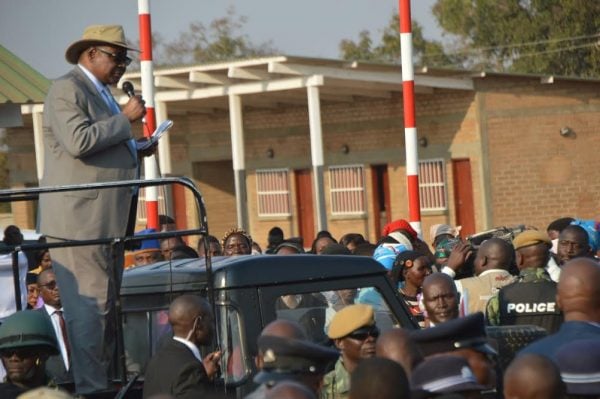‘Yes’ Malawi corruption getting worse, President Mutharika admits
Malawian President Peter Mutharika has responded to the claim by Britain’s High Commissioner Michael Nevin that corruption in his country is “worsening” by admitting that it is.

President Peter Mutharika speaks to people at Ntcheu Bus depot: Corruption seen to be worsening
In a newspaper interview, Nevin who leaves the country at the end of a four-year tour of duty, warned that rule of law could be permanently undermined by failure to arrest those who break the law.
Malawi government official spokesperson and Information and Civic Education Minister Patricia Kaliati rejected the perception that Malawi’s corruption is worsening.
But Mutharika conceded that the country has become significantly more corrupt when he addressed a whistle-stop political at Ntcheu rally on his way from Blantyre to Lilongwe.
He said corruption and fraud continue to affect the country’s development efforts.
“Thirty per cent of donor money goes into the drain through corruption and fraud practices by both government and civil society organizations and we cannot develop with such undesirable practices,” he said.
Basically, Mutharika agreed with Nevin that corruption is getting worse and vowed to root out the vice.
He reiterated his call for the spirit of hard work, integrity, patriotism, unity and honesty.
It is estimated that about 35% of government funds have been stolen over the past decade in systematic looting of public coffers by civil servants, private contractors and politicians, a scandal christened ‘Cashgate’.
Malawians have always known that corruption is rife in the country. But the sheer size of the Cashgate scandal, both in terms of the amount and the wide number of people involved, has shown how deeply rooted the problem is.
The University of Malawi’s Blessings Chinsinga recently pointed out that: “Efforts to root out corruption do not stick because the existing institutional milieu makes it almost impossible to introduce changes that can effectively stamp out corruption.”
The observation is instructive in that Cashgate spans two political administrations. Malawi was led by the late president Bingu wa Mutharika in 2004 and the scandal unravelled on the watch of Joyce Banda in 2013.
Fertile ground for corruption
A number of factors contribute to the current state of affairs.
There is no clear distinction between a party in power and government activities in Malawi, unlike in established democracies. In Malawi, the party in power is the de facto government.
In Malawi, a party in power calls itself boma (a government). Ordinary Malawians look at abuse of state resources by those in power as acceptable. It is almost impossible to tell a party in power from the government.
Even more serious is the fact that political parties in Malawi are not mandated to declare their sources of funding. This breeds corruption and fosters abuse of public resources.
Another contributing factor is that after 21 years of multiparty democracy, governance in Malawi remains heavily centralised. The central government has been reluctant to relinquish some of its powers. The President makes even the smallest of decisions and undertakes mundane tasks that should be reserved for line ministries. This encourages a system of patronage.
Lastly, government contracts, tenders and board memberships all go to sympathisers of the party in power and not necessarily to the best bidder or the most competent applicant. Government sympathisers or ruling party members get contracts regardless of their levels of competence.
This unfairly benefits the incumbents and weakens opposition parties. Businesspeople are afraid of funding opposition parties because they could lose state contracts and other business opportunities.
Scale and depth of corruption exposed
Malawians have always known that corruption is rife in the country. But the sheer size of the Cashgate scandal, both in terms of the amount and the wide number of people involved, has shown how deeply rooted the problem is.
The involvement of the country’s political class in the scandal is in stark contradiction to their penchant for standing on political campaign podiums promising to fight corruption with all their might.
There is an unwritten rule in Malawi that successful businesspeople align themselves with the governing party in order to protect their property and gain more contracts.
Malawi is still learning to cope without support from donors and the jury is still out on whether it has learnt anything from its biggest scandal. A recent article in African Arguments underlines the hopeless feeling that Cashgate has left among most Malawians:
“Malawi’s self-enriching officials need to know they will be judged not just by an imperfect judicial system, but by generation upon future generation of their compatriots.